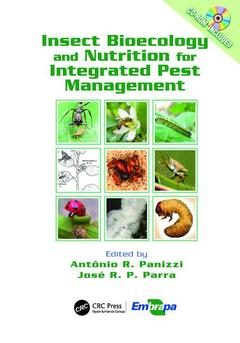Insect Bioecology and Nutrition for Integrated Pest Management
Coordonnateurs : Panizzi Antônio Ricardo, Parra José R. P.

The field of insect nutritional ecology has been defined by how insects deal with nutritional and non-nutritional compounds, and how these compounds influence their biology in evolutionary time. In contrast, Insect Bioecology and Nutrition for Integrated Pest Management presents these entomological concepts within the framework of integrated pest management (IPM). It specifically addresses bioecology and insect nutrition in modern agriculture. Written for graduate students and professionals in entomology, this book covers neotropical information in three sections:
- General Aspects: Basic bioecology and insect nutrition; artificial diets; insect/plant interactions; insect symbionts; the interface of chemical ecology with the food; and insect cannibalism
- Specific Aspects: Specific feeding guilds of insects including ants, social bees, leaf chewers, seed suckers, seed chewers, root feeders, gall makers, detritivorous feeders, pests of storage grains, fruit flies, aphids, endo- and ectoparasitoids, predators, crisopids, and hematophagous insects
- Applied Aspects: Host plant resistance and the design of IPM programs in the context of insect bioecology and nutrition
Much of the research on which these chapters were written was done in Brazil and based on its neotropical fauna. The complexity and diversity of the neotropics provides enough data that readers from all zoogeographical regions can readily translate the information in this book to their specific conditions. The book?s value as an entry point for further research is enhanced by the inclusion of approximately 4,000 references.
GENERAL ASPECTS: Introduction to bioecology and insect nutrition as a basis for integrated pest management. Nutritional indexes to measure food consumption and utilization by insects. The evolution of insect artificial diets and their interactions with science and technology. Insect/plant interactions. Symbionts and insect nutrition. Bioecology and nutrition vs. chemical ecology: multitrophic interactions mediated by chemical signals. Insect cannibalism. SPECIFIC ASPECTS: Ants. Social bees. Defoliators. Seed-sucking bugs. Seed-chewing beetles. Root-feeding beetles. Gall-makers insects. Detritivorours insects. Insect feeding on storaged grains. Fruit flies. Sieve feeding aphids. Parasitoids. Predatory bugs. Predatory beetles. Predatory lacewings. Hematophagous insects. APPLIED ASPECTS: Host plant resistance and insect bioecology and nutrition. Bioecology and insect nutrition for IPM.
Antônio R. Panizzi is a research entomologist at the National Wheat Center in Passo Fundo, RS, Brazil.
José Roberto Postali Parra is a Professor of the Department of Entomology, Plant Pathology, and Agricultural Zoology at the College of Agriculture at the University of Sao Paulo, Brazil.
Date de parution : 10-2016
17.8x25.4 cm
Date de parution : 04-2012
Ouvrage de 744 p.
17.8x25.4 cm
Thèmes d’Insect Bioecology and Nutrition for Integrated Pest... :
Mots-clés :
Artificial Diets; Extrafloral Nectaries; Predatory lacewings; Stink Bugs; Predatory beetles; Host Plant; Predatory Bugs; Insect Nutrition; Parasitoids; Insect Bioecology; Sieve feeding aphids; Mass Rearing; Detrivorous insects; Insect Plant Interactions; Gall-makers insects; Malpighian Tubules; Seed-chewing insects; Southern Green Stink Bug; Seed-sucking bugs; Peritrophic Membrane; Defoliators; Intraguild Predation; Social Bees; Phytophagous Insects; Ants; Nutritional Ecology; Symbionts; Heteropteran Predators; Insect/plant interactions; Instar Caterpillars; Immature Pods; Leaf Litter; Nezara Viridula; Host Selection; Murgantia Histrionica; Maxillary Palps; Insect's Diets; Stingless Bee; Sensillae



